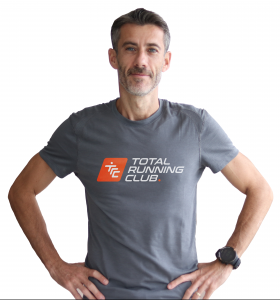When was the last time that you went for a run without a watch, or a phone?
Let’s imagine trying that for a moment. Will you feel panicky because you don’t know your pace or distance, or
will you feel liberated because you realise that all you have to do is run?
Most of us have fallen into the habit at some point in our running journey of fastidiously tracking our weekly
mileage. That is no bad thing; training requires structure and discipline, and a training log is a valuable commodity.
But is the data focus at the expense of our running enjoyment? Arguably sometimes, yes, and perhaps there is a
middle ground to be found instead on this matter.
I’d like to encourage you to try something. On a route that you regularly run at a comfortable pace (an ‘Easy Run’)
during your weekly exercise routine, I’d like you once per week to run that route without wearing a watch (or place
a sticker over your watch so that you can’t look at it, and deactivate any notifications). Don’t panic…you will still
know your mileage, and you can still calculate afterward how long it took you, only you won’t know your pace
during that run.
“But how will I know what pace to run at?”, you might ask. Just run by feel. Find the speed and rhythm that feels
right for the day. Enjoy the freedom. Clear your head. Notice things on the route that you’ve never noticed.
Think or zone out. Breathe. Relax. Just run.
I have highlighted breathing in bold for a good reason. Breathing is one of my favourite topics in relation to
running, and it is something that I find many of my students don’t know enough about in respect of their own
running. Breathing is arguably the best pace regulator on the market, and guess what, it’s free and super easy to
work with! By learning and understanding our own breathing patterns for different running intensities, it becomes
very easy to control our pace via our breathing cadence. For example, on my own Easy Runs, I will never allow my
breathing to go beyond a 3/2 pattern (meaning I inhale for 3 running steps and exhale for 2 steps). Yes, even on an
uphill! So, I don’t need to worry about my pace, I just stick to that rhythm and adjust my pace naturally depending
upon the terrain, my energy level on the day, my fitness level, the weather, etc.
Knowing your pace without depending upon a watch is a crucial skill for a runner. There’s nothing worse than
constantly adjusting your speed back and forth because your watch is telling you that you’re not quite at the pace
that you were aiming for. Equally, in a race, we shouldn’t rely on pacers to judge our speed for the given distance.
You will have good days and bad days in running, both for training and racing. And it’s important to know your
body well enough to know when your ‘normal’ pace is feeling harder or easier than usual. From this, you can judge
and alter your performance expectation for the run.
These days, I find that I wear my running watch less and less, even on my Speed Workouts. Internal perceived
effort can be a very liberating way of training, and I personally no longer need a watch to judge accurately when a
hard session was either extremely unpleasant or just very unpleasant! Of course, it is still reassuring to know your
pace and progress from watch data, but it is not a must. There’s a time and a place for it.
So, if you think you might be addicted to running technology, don’t stress, just mix things up a bit and you might
just find that you’ve forgotten why you run in the first place.
By Jeff Ross
Head Coach and General Manager
Total Running Club


Running Articles
What to do after you’ve run a marathon in order to recover faster
Congratulations! Now that you’ve done all the hard work, including the months of training, and completed a marathon, it’s time to give yourself a little



